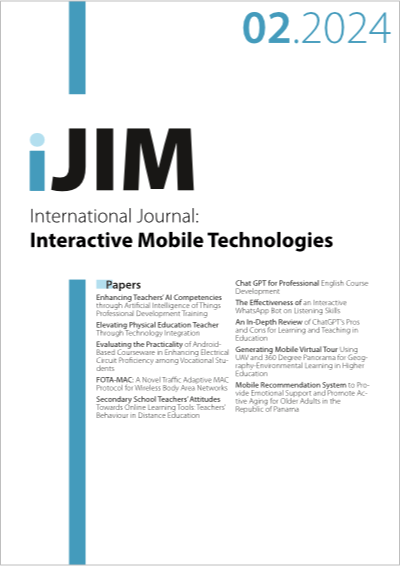Chat GPT for Professional English Course Development
DOI:
https://doi.org/10.3991/ijim.v18i02.46623Keywords:
Keywords — Artificial Intelligence, Сhat GPT, digitization, student, textbook, universityAbstract
Digitalization of all life spheres is the reality of modern world development. The global digitization creates a powerful information environment. Its navigation requires serious tools for structuring, systematizing and processing information. Digital processes, as the most progressive, are in constant development. Artificial Intelligence (AI) is gaining popularity. The latest product that has created a lot of discussion is СhatGPT (Generative Pre-trained Transformer) from OpenAI, which is an artificial intelligence chatbot that demonstrates the ability of digital devices to perform the tasks inherent to intelligent beings. The paper shows some issues of using ChatGPT for making a new course of Law English, a curriculum, a syllabus at the tertiary level removing concerns related to its application and utilization. The purpose of the manuscript is to describe a real case of working out a professional English course for university students applying ChatGPT. The methods of analysis, synthesis, case study, expert assessment were used. The results are as follows: a new course for Law English training, a curriculum, a syllabus and a textbook using content created by ChatGPT were readied. The conclusion is that, nowadays, everything can be taught by a teacher partly with an AI. ChatGPT can be used for a wide variety of educational purposes, including providing information, generating necessary texts, tasks, tests, and answering many questions. Most of the mentioned ChatGPT services are important educational elements in language teaching and learning, they can be used for professional English course development.
Downloads
Published
How to Cite
Issue
Section
License
Copyright (c) 2023 Prof Ilona Kostikova, Prof. Liudmyla Holubnycha , Dr Tetiana Besarab , Dr Olena Moshynska, Dr Tetiana Moroz, Dr Iuliia Shamaieva

This work is licensed under a Creative Commons Attribution 4.0 International License.



